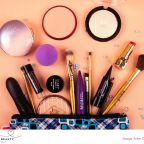
I’m a skincare expert – here’s how to identify your skin type
Between hormones, sleep, and pollution, your skin can be impacted by so many factors. These common fluctuations can make understanding your skin and finding skincare that works for it challenging.
But ultimately everyone has a skin type, and knowing this can be key to building a skincare routine that will protect, nourish, and improve your skin.
And it seems that people are trying to understand their skin and its needs a little more, as Absolute Collagen has spotted that searches for ‘sensitive skin care’ have risen by 19%, while symptom queries such as ‘red dry patches on face’ are also up by 23% in the last 3 months.
So to help, Absolute Collagen’s resident skin expert Dr Sophie Shotter explains the different skin types, along with which products to choose, and how it can affect your makeup: :
“Knowing your skin type can be super helpful when it comes to identifying problems and finding solutions for optimal skin health. And there are four main skin types that most people will fall under: sensitive, dry, oily and combination.”
Sensitive skin
“Sensitive skin has a reactive nature and includes those with conditions such as rosacea or eczema, often meaning there is an overlap for those with dry skin. If you have sensitive skin, focus on ingredients like ceramides and lipids. These will help lock in moisture to your skin and soothe any irritation. It may also be worth considering whether there may be an underlying medical diagnosis that needs prescription products to address. If you are suffering, don’t hesitate to get an expert opinion.
“Knowing our skin type is also helpful when it comes to makeup, those with sensitive skin should look for non-comedogenic products. These will contain gentler ingredients that are designed to minimise the likelihood of clogged pores, breakouts, or irritation. And when introducing a new product into your routine, do a patch test, trying a small amount on your skin and waiting 24 hours to make sure it won’t cause a reaction.”
Dry skin
“Dry skin is skin that feels tight after cleansing unless a moisturiser is quickly applied. It can be prone to dry, red patches and can also feel itchy. Those with dry skin benefit from hydrating ingredients such as hyaluronic acid, niacinamide, and glycerin, as well as ceramides and lipids.
“When it comes to makeup, those with dry skin will benefit from using hydrating face makeup products, with a little base going a long way. Due to the nature of dry skin, any foundation or concealer used is likely to stay in place all day long.”
Oily skin
“Those with oily skin produce more oil than most, meaning their skin can look shiny, makeup doesn’t stay in place, and they may be more prone to breakouts. Oily skin benefits from products containing acids, such as salicylic acid which can help reduce oil production. Niacinamide is also a great option to include in your routine to minimise breakouts and smooth the skin.
“Those with oily skin will benefit from using makeup products that contain ingredients that reduce oil production. Look out for those that can reduce pores and mattify the skin.”
Combination skin
“Those with combination skin tend to have different types in different places. For example, the skin tends to be oily in the T zone and dryer across the cheeks. So, a ‘mosaic’ approach to skincare is best for this skin type. This means building your routine so that each part of the face gets the targeted TLC it needs.
“To help manage oily buildup in certain areas on the days you’re wearing makeup, blotting paper is a great option for controlling shine and mattifying the skin.”
To shop collagen supplements or collagen-boosting skincare, visit the Absolute Collagen website.



